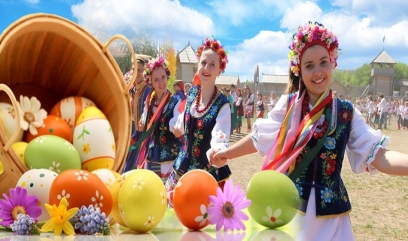Урок країнознавства ,,Spring festivals around the world,,
Topic: SPRING FESTIVALS AROUND THE WORLD
(Cultural corner)
The 6th form
Objectives:
- Practical: to develop pupils’ communicative skills, using active lexis on the topic, to train in listening comprehension.
- Educative: to teach pupils to work in pairs and groups, to motivate them in expressing their own opinions and views on the topic; to encourage pupils to discover the world, to learn and compare spring holidays traditions in different countries.
- Social: to make pupil interested in cognition the culture of the different countries, to develop in pupils love to their Motherland, to take care of nature, to be proud of our national traditions.
Teacher: Good morning, pupils! How are you doing today?
P Great. Fine. Awesome. Ready to study.
T I` m glad to hear that you are ready to new knowledge. Look at the blackboard. What can you see on the pictures?
P Festivals and celebrations.
T Yes, you are right. The topic of our today`s lesson is spring and its wonderful festivals, holidays and traditions. Spring is coming and bringing us beautiful flowers, sunny weather and merry holidays.
Part I Warm - up
T What is spring? And how do you think why am I interested in this season and try to connect it with celebrations?
P The winter is over. There is no ice in the lakes and rivers. There is no snow on the ground. The days are longer and warmer, and the nights are shorter.
The sky is blue and the sun is shining brightly. It is getting warmer and warmer. The wind often blows very hard in spring. Sometimes the wind is cold, but more often it is warm. When rain and sunshine meet you can see a rainbow in the sky.
Everything becomes green. The birds are coming back from the south.
For me spring means the beginning of new life and new emotions.
We want to stay outdoor as more as possible.
Teacher: Well done! I definitely agree with you, spring is my favourite season too. But it seems to me that people like spring not only because of the warm weather and cool activities. Spring is also famous for its fascinating holidays. What spring holidays do you know?
Pupils: Easter, All fools` Day, Shevchenko` Days, Mothers` Day, my birthday.
Teacher: Yes, you are right but all these holidays are celebrated in Ukraine.
Today I propose to broaden our horizons, leave our classroom and go on a trip.
P Okay, we are ready!
T Before I will say the topic of our today`s lesson out loud – answer the questions
- Have you ever been to Japan?
- Have you ever travelled abroad?
- Have you ever travelled by plane?
- Have you ever crossed the ocean?
- Have you ever taken part in the carnival?
- Have you ever seen the cherry flowers blooming?
T Oh, I heard lots of negative answers and I think the lesson will be interesting for you
The topic of our lesson is ,,Spring festivals and celebration around the world,,
T First, tell we why do people adore travelling?
P They can make new friends, take lots of memory photos, try local dishes, practice language, see places of interests, visit museums, galleries
T Great ideas. So, guys I`m not sure if we`ll try local food and make new friends, but I`m definitely sure that we`ll get to know lots of interesting facts about celebrations in different countries.
So, let`s start our adventures!
MAIN PART
T What comes to your mind when you hear the words CELEBRATION and FESTIVALS
Let`s complete the words map
(follow the link and start voting)
Use MENTIMETER program
P Parade, feast, firework, friends, presents, family, costumes, traditions, symbols, light sparklers, barbecue, carnival, gifts, picnics.
Part I
T I have never been neither to Japan nor to India or the UK. So, how can I get the information about the traditions and holidays in these countries.
P You may use the Internet.
T Great answer. Of course we use the Internet when we need to find some information. So, here is my laptop, can you give me step-by-step instruction – what should I do to find the information about the spring festival around the world.
P – first you should plug your laptop in to the power source
- Then to turn it on ( green light flashes)
- After that you connect the laptop to the Wi-Fi net
- Open Google app
- Type the information you need to find
- Follow website
- If the information is interesting you may copy it out
T Thank for your help. Now We are ready to start
I propose to revise grammar material
Complete the sentences, put the verbs in the correct form, use Present Perfect
1. We _______ already the lesson. ( start )
2. Our teacher __________ the interesting texts. ( print )
3. The students _________ the tasks yet. ( not do )
4. _____ you ____ to the UK? ( be )
5. She ______ a lot of information for the lesson. ( download )
6. The teacher and her students ________ just the laptop to the Internet. ( connect)
7. We __________ the QR code yet ( not scan )
8. ______ Marko ______ the questions correctly? ( answer )
9. ______ we_______ the smartboard in? ( plug)
Part IV
Practice reading
T. There are hundreds of amazing celebrations around the world. Here are the pictures of some of them.
(Showing the pictures)
Text 1 HANAMI: A Flowering Celebration!
The beginning of spring (March-April) is a very special time in Japan, because this is when Japan’s famous cherry trees come into flower. The Japanese celebrate this happy time with festivals and flower-viewing parties.
At the end of winter, everyone’s excitement starts to grow. The whole country wants to know the exact day when the cherry flowers (“sakura”) will appear. Starting in February, weathermen try to guess when this day will be.
When the first flowers open on the trees, national joy breaks out. There are rides and games for children in the streets, music and dance performances, tea ceremonies, flower displays, and much more. But the most special thing that people do at this time is have “Hanami” parties. Hanami means flower watching. In Hanami parties, families and friends take a picnic and go and sit under a cherry tree to look and admire the flowers. Hanami parties take place during the daytime and also at night, because when it is dark, lights light up the cherry trees.
Task 1 Use the text and finish the sentences
Use the text and finish the sentences
1. Hanami is celebrated in ….
2. The whole country wants to know the ….. day when the cherry flowers ….. ……
3. In Japan cherry flowers are called …..
4. Hanami means « …… ….. »
5. Japanese go and sit …… ……. ……
6. Hanami parties takes place not only the daytime but also …….
Text 2 Colour festival in India
Holi is the ancient Hindu festival of colours and love. It is celebrated in India.
Holi marks the beginning of spring. It is a celebration of good winning over evil, and a time to give thanks for the good harvest. The dates change each year according to the full moon, but it is normally in March and sometimes in late February. People go outside and throw coloured paint powder at each other. It does not matter if you are rich, poor, old or young – everyone can throw paint and everyone can get messy! There is a spirit of togetherness and equality. It is a time to forgive people and repair broken relationships, as well as meet with other people, play and have fun.
The Holi festival takes place over one night and the following day. In the days before the festival begins, people will stock up on supplies, such as food, drinks, pigments, and wood to create an effigy for the bonfire.
- Holi is a festival of colours that is celebrated in India.
- It is celebrated in March.
- This colourful festival is celebrated in the spring season.
- We usually wear white clothes on the day of Holi.
- We play with bright colours like blue, green, pink, yellow etc.
- My mother prepares delicious sweets, and we distribute them in our neighbourhood.
- We play with different colours using water balloons and pichkaris.
- Holi begins with burning the demoness Holika.
- We collect wood and burn it and celebrate by dancing and singing around it.
- Holi teaches us the victory of good over bad.
TEXT 2 Answer the questions
1. What does Holi mark?
2. Does the date of celebration the holiday change?
3. Is it true that only rich people take part in celebration Holi?
4. What do people usually wear on the day of celebration?
5. How does the celebration of Holi begin?
6. What is the main idea of the holiday?
7. What do people usually do during the celebration?
8. Do people only throw paint at each other?
Text 3
Pancake Day
In the UK, people celebrate Pancake Day. This festival takes place in February, on Shrove Tuesday. This is the day before Lent. Lent is an important time in the Christian calendar. It lasts 47 days. During Lent, people traditionally stop eating delicious food, like cakes and chocolate. So on Shrove Tuesday, they must eat up all the nice food in their cupboards. So they make pancakes, and they often eat them with lemon and sugar.
The tradition of pancake races started in Olney, Buckinghamshire. According to a story, a housewife made pancakes on Easter Sunday in 1445. Then she heard the church bells. She was worried because she was late for church, so she ran to church with her pan and pancake in her hand! Now, Olney’s pancake race is famous.
Westminster School, an old boys’ school in London, has a different pancake tradition. The school cook makes a huge pancake and throws it over a five-meter high bar. The schoolboys run to take a piece of the pancake. The boy with the biggest piece of pancake wins some money!
These days, few British people give up delicious food for Lent. But most people eat pancakes on Pancake Day.
( follow the link and watch video )
https://www.youtube.com/watch?v=oUZJak11d0o
TEXT 3 Watch the video. After that match the words from the brackets with their definitions
( pancake, pancakes race, Lent, Shrove Tuesday, Mandi Gras )
1. A period of time before Easter in Christian calendar which lasts for 40 days….
2. The day before Lent start which is also called Pancake Day in the UK….
3. A sweet delicious dish which is made from milk, eggs, flour and butter…..
4. A competition between runners carrying pancakes on their frying pans….
5. It is a popular carnival in America with celebrations, parades and parties before Lent….
Summarizing
T To summarize everything we were discussing about during the lesson I `d like to say that you were great, active and smart. We discovered the world. We visited different countries which traditions and celebrations are rather different then in Ukraine.
At home I ask you to describe the picture which shows one of Ukrainian celebration

Over lesson is over. See you next time. Have a nice day


про публікацію авторської розробки
Додати розробку
